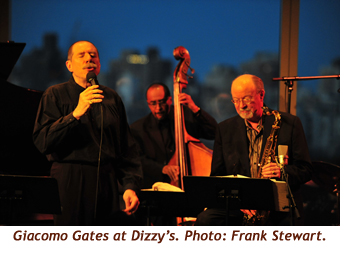 Album: Giacomo Gates, The Revolution Will Be Jazz: The Songs of Gil Scott-Heron
Album: Giacomo Gates, The Revolution Will Be Jazz: The Songs of Gil Scott-Heron
?Basie was never really commonplace?he was always measures ahead.
Ellington was more than number one for the music and things that he said.
Bird was the word back when tenors were heard
from Kansas right up to the pres (Lester Young)
Billie was really the queen of the scene that keeps echoing on in my head.
What it has will surely last, but is that jazz??
Gil Scott-Heron, ?Is That Jazz??
Blowing the Status Quo From Its Comfort Zone With a Voice as Sweet and Dark as Shoo-fly Pie
Gil Scott-Heron’s status as an American cultural icon is primarily based on his early ?70s spoken word recording ?The Revolution Will Not be Televised,? a weighty but thrilling prophecy influencing scores of young folks to shrug off their culturally imposed ignorance and apathy and dedicate themselves to positive social change.
One of these young people, record producer Mark Ruffin, recently got a hankering to produce an album covering Scott-Heron jazz songs in the vocalese baritone style that Gil had exemplified. Baritone Giacomo Gates was the perfect fit. Also appropriate: the fact that he was a veteran of years of remarkable jazz achievements, had rubbed shoulders with jazz greats (Sarah Vaughan was one mentor), and possessed a deeply rooted beatnik aesthetic.
Gil created almost two dozen albums in his lifetime, but when Gates was going through the oeuvre picking the songs for this new album he steered away from the better-known ditties and reduced his selection to a collection of songs notable for their subtle but pointed social commentary.
It’s evident from the first listen that these were the songs that Gates knew he could sing with sincerity; when he sings It’s as if he means every word, identifies with the sentiments expressed in these lyrics, and is wholeheartedly behind them.
And so we have on this album a critique of consumerism (?Madison Avenue?), a song about the false glamour of the entertainment industry (?Show Bizness?), a prayer for universal freedom (?This Is A Prayer For Everybody To Be Free?), hymns to jazz legends (?Lady Day And John Coltrane? and ?Is That Jazz?), and a call to self-realization (?It’s Your World?). If you feel the urge to give up your art and enroll in law school, give this disk a spin. It might just wake you up.
Yes, these songs were written in the 1970s. And yes, the band swings (boy, do they swing) with classic cool jazz evocative of the early ?70s, seasoned with funk, barrelhouse piano, fusion, and some fine free jazz passages rendered exquisite by the firm musical structures framing them. There’s an extremely expressive and playful flute on several tracks, and when the bass starts walking you’ll want to follow it all around the churchyard.
As Giacomo explained in a recent phone conversation, some Americans still feel threatened by the songs of Gil Scott-Heron even though he says nothing overtly threatening. If certain white folks could get past their false sense that the protests of African-American activists are somehow a threat to them personally, they’d find much edification in these songs, which in essence are telling us to toss our unexamined lives and really start living.
What was scary and new about Gil was that this guy could see the truth and wasn’t afraid to say it. Even in traditional jazz this mindset will always be avant-garde because of how it swells up, bursts the walls, and then puts the house back together again. Gil Scott-Heron was a social critic; the fact that he was black made his art more frightening to the status quo even as it made it more relevant to the construction of a just society.
Wanda also penned the poems for the artist book They Tell My Tale to Children Now to Help Them to be Good, a collection of meditations on fairy tales, illustrated by artist Susan Malmstrom.


